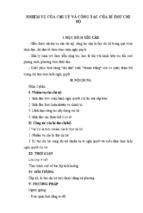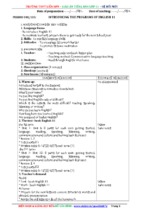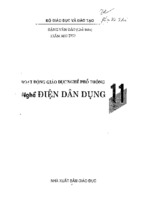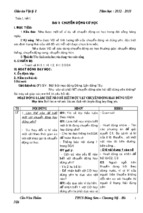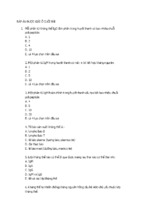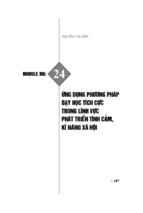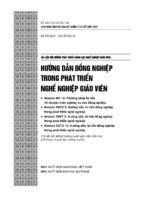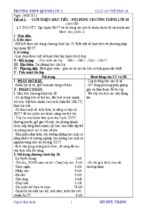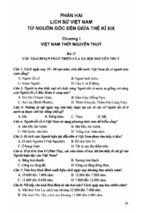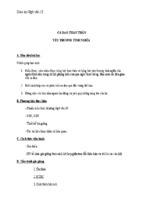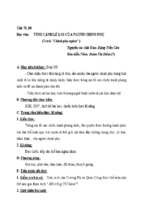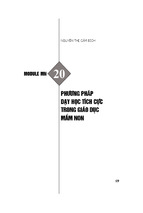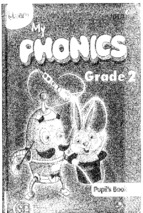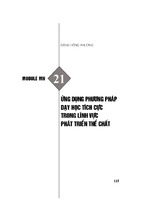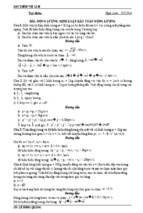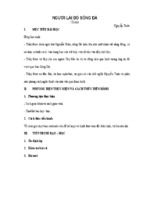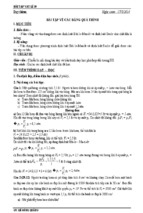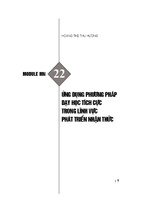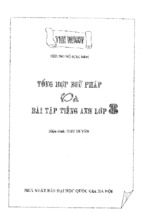TRƯỜNG THPT CHUYÊN
NGUYỄN QUANG DIÊU
THI THỬ THPTQG LẦN 1 NĂM HỌC 2015-2016
MÔN TIẾNG ANH
Thời gian làm bài:90 phút
Ngày kiểm tra:26/03/2016
(Đề gồm 07 trang)
Mã đề thi
603
(Thí sinh không được sử dụng tài liệu)
Họ, tên thí sinh:............................................................................................ Lớp: .............................
SECTION A (8 points)
Read the following passage and mark the letter A, B, C, or D on your answer sheet to indicate the
correct answer to each of the questions.
Learning means acquiring knowledge or developing the ability to perform new behaviors. It is
common to think of learning as something that takes place in school, but much of human learning
occurs outside the classroom, and people continue to learn throughout their lives.
Even before they enter school, young children learn to walk, to talk, and to use their hands to
manipulate toys, food, and other objects. They use all of their senses to learn about the sights, sounds,
tastes, and smells in their environments. They learn how to interact with their parents, siblings,
friends, and other people important to their world. When they enter school, children learn basic
academic subjects such as reading, writing, and mathematics. They also continue to learn a great deal
outside the classroom. They learn which behaviors are likely to be rewarded and which are likely to
be punished. They learn social skills for interacting with other children. After they finish school,
people must learn to adapt to the many major changes that affect their lives, such as getting married,
raising children, and finding and keeping a job.
Because learning continues throughout our lives and affects almost everything we do, the study of
learning is important in many different fields. Teachers need to understand the best ways to educate
children. Psychologists, social workers, criminologists, and other human-service workers need to
understand how certain experiences change people’s behaviors. Employers, politicians, and
advertisers make use of the principles of learning to influence the behavior of workers, voters, and
consumers.
Learning is closely related to memory, which is the storage of information in the brain.
Psychologists who study memory are interested in how the brain stores knowledge, where this storage
takes place, and how the brain later retrieves knowledge when we need it. In contrast, psychologists
who study learning are more interested in behavior and how behavior changes as a result of a
person’s experiences.
There are many forms of learning, ranging from simple to complex. Simple forms of learning
involve a single stimulus. A stimulus is anything perceptible to the senses, such as a sight, sound,
smell, touch, or taste. In a form of learning known as classical conditioning, people learn to associate
two stimuli that occur in sequence, such as lightning followed by thunder. In operant conditioning,
people learn by forming an association between a behavior and its consequences (reward or
punishment). People and animals can also learn by observation - that is, by watching others perform
behaviors. More complex forms of learning include learning languages, concepts, and motor skills.
Question 1: According to the passage, which of the following is learning in broad view comprised of?
A. Knowledge acquisition outside the classroom
B. Knowledge acquisition and ability development
C. Acquisition of academic knowledge
Mã đề 603 - Trang 1/9
D. Acquisition of social and behavioural skills
Question 2: According to the passage, what are children NOT usually taught outside the classroom?
A. literacy and calculation
B. life skills
C. interpersonal communication
D. right from wrong
Question 3: Getting married, raising children, and finding and keeping a job are mentioned in
paragraph 2 as examples of _____.
A. the changes to which people have to orient themselves
B. the areas of learning which affect people’s lives
C. the situations in which people cannot teach themselves
D. the ways people’s lives are influenced by education
Question 4: Which of the following can be inferred about the learning process from the passage?
A. It becomes less challenging and complicated when people grow older.
B. It takes place more frequently in real life than in academic institutions.
C. It is more interesting and effective in school than that in life.
D. It plays a crucial part in improving the learner’s motivation in school.
Question 5: According to the passage, the study of learning is important in many fields due to _____.
A. the great influence of the on-going learning process
B. the need for certain experiences in various areas
C. the influence of various behaviours in the learning process
D. the exploration of the best teaching methods
Question 6: It can be inferred from the passage that social workers, employers, and politicians
concern themselves with the study of learning because they need to _____.
A. change the behaviours of the objects of their interest towards learning
B. make the objects of their interest more aware of the importance of learning
C. thoroughly understand the behaviours of the objects of their interest
D. understand how a stimulus relates to the senses of the objects of their interest
Question 7: The word “retrieves ” in paragraph 4 is closest in meaning to _____.
A. recovers
B. gains
C. Creates
D. generates
Question 8: Which of the following statements is NOT true according to the passage?
A. Psychologists are all interested in memory as much as behaviours.
B. Psychologists studying memory are concerned with how the stored knowledge is used.
C. Psychologists studying learning are interested in human behaviours.
D. Psychologists studying memory are concerned with the brain’s storage of knowledge.
Question 9: According to the passage, the stimulus in simple forms of learning _____.
A. makes associations between behaviours
B. is created by the senses
C. is associated with natural phenomena
D. bears relation to perception
Question 10: The passage mainly discusses _____.
A. practical examples of learning inside the classroom
B. application of learning principles to formal education
C. general principles of learning
D. simple forms of learning
Mark the letter A, B, C, or D on your answer sheet to show the underlined part that needs
correction.
Question 11: Since erecting in 1886, the Statue of Liberty has served as a symbol of freedom.
A
B
C
D
Question 12: Not until I was on my way to the airport that I realized I had left my passport at home.
A
B
C
D
Question 13: She asked why did Mathew look so embarrassed when he saw Carole.
A
B
C
D
Mã đề 603 - Trang 2/9
Question 14: Dogs that are trained to lead the blind must be loyalty, intelligent and calm.
A
B
C
D
Question 15: It is noisy enough in this room, so I would rather you stop shouting like that.
A
B
C
D
Read the following passage and mark the letter A, B, C, or D on your answer sheet to indicate the
correct word for each of the blanks.
THE FIRST WOMAN SCIENTIST
Hypatia was born in Alexandria, in Egypt, in 370 A.D. For many centuries, she was (16)_____ only
woman scientist to have a place in the history books.
Hypatia's father was director of Alexandria University, and he (17)_____ sure his daughter had the best
education available. This was unusual, as most women then had few (18)_____ to study.
After studying in Athens and Rome, Hypatia returned to Alexandria (19)_____ she began teaching
mathematics. She soon became famous (20)_____ her knowledge of new ideas.
We have no copies of her book, (21)_____ we know that she wrote several important mathematical
works. Hypatia was also interested in technology and (22)_____ several scientific tools to help with
her work.
At the (23)_____, many rulers were afraid of science, and (24)_____ connected with it was in danger.
One day in March 415, Hypatia (25)_____ attacked in the street and killed.
Question 16:
Question 17:
Question 18:
Question 19:
Question 20:
Question 21:
Question 22:
Question 23:
Question 24:
Question 25:
A.
A.
A.
A.
A.
A.
A.
A.
A.
A.
a
could
teachers
where
for
or
did
time
something
had
B.
B.
B.
B.
B.
B.
B.
B.
B.
B.
the
put
classes
there
in
as
learnt
day
anyone
has
C.
C.
C.
C.
C.
C.
C.
C.
C.
C.
one
made
opportunities
how
by
because
experimented
period
nobody
was
D.
D.
D.
D.
D.
D.
D.
D.
D.
D.
an
said
customs
which
from
but
invented
year
all
is
Mark the letter A, B, C, or D on your answer sheet to indicate the word whose underlined part
differs from the other three in pronunciation in each of the following questions.
Question 26: A. challenge B. chemical
Question 27: A. effective B. habit
C. achieve
C. climate
D. approach
D. dolphin
Mark the letter A, B, C, or D on your answer sheet to indicate the word or phrase that is CLOSEST
in meaning to the underlined part in each of the following questions.
Question 28: The lost hikers stayed alive by eating wild berries and drinking spring water.
A. connived
B. survived
C. revived
D. surprised
Question 29: Although they had never met before the party, Jim and Jane felt strong affinity to each
other.
A. attraction
B. moved
C. interest
D. enthusiasm
Question 30: I’m becoming increasingly absent-minded. Last week, I locked myself of out my house
twice.
A. often forgetting things
B. being considerate of things
C. forgetful of one’s past
D. remembering to do right things
Mark the letter A, B, C, or D on your answer sheet to indicate the word or phrase that is OPPOSITE
in meaning to the underlined part in each of the following questions.
Mã đề 603 - Trang 3/9
Question 31: The Red Cross is an international humanitarian agency dedicated to reducing the
sufferings of wounded soldiers, civilians and prisoners of war.
A. happiness
B. pain and sorrow
C. worry and sadness D. loss
Question 32: Unless the two signatures are identical, the bank won’t allow you to withdraw your
money.
A. genuine
B. different
C. fake
D. similar
Mark the letter A, B, C, or D on your answer sheet to indicate the word that differs from the other
three in the position of primary stress in each of the following questions.
Question 33: A. surrounding B. sensitive
Question 34: A. occupation B. investigate
Question 35: A. curriculum B. currency
C. assurance
C. miraculous
C. compulsory
D. solution
D. convenient
D. commitment
Read the following passage and mark the letter A, B, C, or D on your answer sheet to indicate the
correct answer to each of the questions.
In the West, cartoons are used chiefly to make people laugh. The important feature of all these
cartoons is the joke and the element of surprise which is contained. Even though it is very funny, a
good cartoon is always based on close observation of a particular feature of life and usually has a
serious purpose.
Cartoons in the West have been associated with political and social matters for many years. In
wartime, for example, they proved to be an excellent way of spreading propaganda. Nowadays
cartoons are often used to make short, sharp comments on politics and governments as well as on a
variety of social matters. In this way, the modern cartoon has become a very powerful force in
influencing people in Europe and the United States.
Unlike most American and European cartoons, however, many Chinese cartoon drawings in the past
have also attempted to educate people, especially those who could not read and write. Such cartoons
about the lives and sayings of great men in China have proved extremely useful in bringing education
to illiterate and semi-literate people throughout China. Confucius, Mencius and Laozi have all
appeared in very interesting stories presented in the form of cartoons. The cartoons themselves
have thus served to illustrate the teachings of the Chinese sages in a very attractive way.
In this sense, many Chinese cartoons are different from Western cartoons in so far as they do not
depend chiefly on telling jokes. Often, there is nothing to laugh at when you see Chinese cartoons.
This is not their primary aim. In addition to commenting on serious political and social matters,
Chinese cartoons have aimed at spreading the traditional Chinese thoughts and culture as widely as
possible among the people.
Today, however, Chinese cartoons have an added part to play in spreading knowledge. They offer a
very attractive and useful way of reaching people throughout the world, regardless of the particular
country in which they live. Thus, through cartoons, the thoughts and teachings of the old Chinese
philosophers and sages can now reach people who live in such countries as Britain, France, America,
Japan, Malaysia or Australia and who are unfamiliar with the Chinese culture.
Until recently, the transfer of knowledge and culture has been overwhelmingly from the West to the
East and not vice versa. By means of cartoons, however, publishing companies in Taiwan, Hong Kong
and Singapore are now having success in correcting this imbalance between the East and the West.
Cartoons can overcome language barriers in all foreign countries. The vast increase in the popularity
of these cartoons serves to illustrate the truth of Confucius’s famous saying “One picture is worth a
thousand words.”
Mã đề 603 - Trang 4/9
Question 36: Which of the following clearly characterizes Western cartoons?
A. Seriousness, propaganda, and attractiveness. B . Enjoyment, liveliness, and carefulness.
C. Humour, unexpectedness, and criticism.
D. Originality, freshness, and astonishment.
Question 37: Chinese cartoons have been useful as an important means of
.
A. amusing people all the time
B. educating ordinary people
C. spreading Western ideas
D. political propaganda in wartime
Question 38: The major differences between Chinese cartoons and Western cartoons come from
their
.
A. purposes
B. values
C. nationalities
D. styles
Question 39: The pronoun “this” in paragraph 4 mostly refers to
.
A. a propaganda campaign
B. a funny element
C. a piece of art
D. an educational purpose
Question 40: The passage is intended to present
.
A. a description of cartoons of all kinds the world over
B. an opinion about how cartoons entertain people
C. an outline of Western cartoons and Chinese cartoons
D. a contrast between Western cartoons and Chinese cartoons
Question 41: Which of the following could be the best title for the passage?
A. An Excellent Way of Spreading Propaganda
B. A Very Powerful Force in Influencing People
C. Cartoons as a Way of Educating People
D. Chinese Cartoons and Western Cartoons
Question 42: In general, Chinese cartoons are now aiming at
.
A. spreading the Chinese ideas and cultural values throughout the world
B. bringing education to illiterate and semi-literate people in the world
C. illustrating the truth of Chinese great men’s famous sayings
D. disseminating traditional practices in China and throughout the world
Question 43: The word “imbalance” in paragraph 6 refers to
.
A. the influence of the East cartoons over the West cartoons
B. the dominant cultural influence of the West over the East
C. the discrimination between the West culture and the East culture
D. the mismatch between the East cartoons and the West cartoons
Question 44: Which of the following is most likely the traditional subject of Chinese cartoons?
A. The stories and features of the lives of great men the world over.
B. The illiterate and semi-literate people throughout China.
C. The philosophies and sayings of ancient Chinese thinkers.
D. Jokes and other kinds of humour in political and social matters.
Question 45: According to the passage, which of the following is true?
A. Language barriers restricted cartoons.
B. Cartoons will replace other forms of writing.
C. Western cartoons always have a serious purpose.
D. Cartoons can serve various purposes.
Mark the letter A, B, C, or D on your answer sheet to indicate the correct answer to each of the
following questions.
Question 46: The more effect you put in this project, _____.
A. the results are more and more satisfying
B. the more satisfaction the results are
C. the more satisfying the results are
D. the more satisfied are you
Mã đề 603 - Trang 5/9
Question 47: My father sometimes _____ the washing up after dinner.
A. takes
B. does
C. washes
D. makes
Question 48: You have to take the full course of your antibiotics even if you feel better, _____ your
illness will simply return.
A. whereas
B. such as
C. so that
D. otherwise
Question 49: I’d like to _____ this old car for a new model but I can’t afford it.
A. convert
B. exchange
C. replace
D. interchange
Question 50: We bought some _____.
A. German lovely old glasses
B. old lovely German glasses
C. German old lovely glasses
D. lovely old German glasses
Question 51: The shop assistant is ready to _____ me a helping hand. She is very nice.
A. take
B. lend
C. offer
D. get
Question 52: Young people have become increasingly committed _____ social activities.
A. of
B. in
C. to
D. at
Question 53: Never before _____ in an earnest attempt to resolve their differences.
A. the leaders of these two countries have met B. have the leaders of these two countries meet
C. met the leaders of these two countries
D. have the leaders of these two countries met
Question 54: Global warming will result _____ crop failures and famines.
A. for
B. of
C. in
D. with
Question 55: As you’ve arrived late, you’ll have to _____ the time you’ve lost.
A. make up to
B. do up for
C. do up to
D. make up for
Question 56: For the first time in 70 years, ______ aspirin's potential beyond reducing pain, fever and
inflammation.
A. researchers begin understanding
B. researchers began understand
C. researchers’ understanding of
D. researchers began to understand
Question 57: Cindy wanted to drive her best friend to have dinner at an Italian restaurant but her car
couldn't start. Therefore, she had to borrow one from Nancy. Choose the most suitable response to fill
in the blank in the following exchange.
Cindy: “Would you mind lending me your car?” - Nancy: “_____.”
A. Yes. Here it is
B. Yes, let's
C. No, not at all
D. Great
Question 58: He _____ to the doctor after the accident, but he went on playing instead.
A. didn’t have to go
B. couldn’t go
C. should have gone D. must have gone
Question 59: The information in this article is _____ inaccurate.
A. historic
B. historical
C. history
D. historically
Question 60: Inexperienced _____, she can know the way of operating that system.
A. even though she is B. as she might
C. she may be though D. as she may be
Question 61: Marie Curie, _____, was awarded a Nobel Prize for her work.
A. the scientist discovered radium
B. whose scientific discovery of radium
C. was the scientist who discovered radium
D. the scientist who discovered radium
Question 62: Martin Luther King Jr, after his father's assassination, _____ the mission of his father to
fight for the rights of blacks in America and achieved some notable success in the 1970s.
A. continuing
B. and continues
C. continue
D. continued
Question 63: Mary invited her friend, Sarah, to have dinner out that night and Sarah accepted. Choose
the most suitable response to fill in the blank in the following exchange.
Mary: “Shall we eat out tonight ?” – Sarah: “_____.”
A. It’s kind of you to invite
B. You are very welcome
C. That’s a great idea
D. That’s acceptable
Question 64: _____ electric eels send a series of blips of electricity into the water around them and
they can detect the pattern of electricity of the water changes.
A. Every
B. Of each
C. All
D. All of
Mã đề 603 - Trang 6/9
SECTION B (2 points)
I. Finish each of the following sentences in such a way that it means the same as the sentence
printed before it. Write your answers on your answer sheet.
Question 65: Mr. Smith knew little about the Internet, so he didn’t invest in any computer companies.
If Mr. Smith
Question 66: The tea was too hot for Peter to drink.
The tea was so
Question 67: I last had my hair cut when I left her.
I haven’t
Question 68: “I’m sorry, I didn’t call you this morning,” Tom said to Mary.
Tom apologised
Question 69: Immediately after his arrival, things went wrong.
No sooner
II. In about 140 words, write a paragraph about women’s roles in modern society. Write your
paragraph on your answer sheet.
The following prompts might be helpful to you.
-
Housewives
-
Breadwinners
-
Leaders
THE END.
TRƯỜNG THPT CHUYÊN
NGUYỄN QUANG DIÊU
THI THỬ THPTQG LẦN 1 NĂM HỌC 2015-2016
MÔN TIẾNG ANH
Ngày kiểm tra:26/03/2016
HƯỚNG DẪN CHẤM
SECTION A (0.125 x 64 = 8 points)
Ðáp án 603:
1. B
8. A
15. D
22. D
29. A
36. C
43. B
50. D
57. C
64. C
Ðáp án 714:
1. D
8. C
15. C
22. D
29. C
36. C
2. A
9. D
16. B
23. A
30. A
37. B
44. C
51. B
58. C
3. A
10. C
17. C
24. B
31. A
38. A
45. D
52. C
59. D
4. B
11. A
18. C
25. C
32. B
39. B
46. C
53. D
60. D
5. A
12. C
19. A
26. B
33. B
40. D
47. B
54. C
61. D
6. C
13. B
20. A
27. C
34. A
41. D
48. D
55. D
62. D
7. A
14. D
21. D
28. B
35. B
42. A
49. B
56. D
63. C
2. B
9. B
16. A
23. A
30. D
37. A
3. A
10. B
17. D
24. B
31. B
38. B
4. B
11. A
18. C
25. A
32. B
39. D
5. B
12. D
19. C
26. D
33. B
40. C
6. B
13. A
20. A
27. D
34. C
41. D
7. A
14. A
21. B
28. D
35. D
42. B
Mã đề 603 - Trang 7/9
43. D
50. C
57. C
64. D
Ðáp án 825:
1. B
8. A
15. D
22. D
29. B
36. B
43. D
50. B
57. B
64. A
Ðáp án 936:
1. D
8. D
15. D
22. D
29. C
36. A
43. C
50. D
57. B
64. B
44. A
51. B
58. A
45. C
52. D
59. C
46. B
53. D
60. D
47. B
54. A
61. C
48. C
55. A
62. D
49. C
56. C
63. D
2. A
9. A
16. B
23. C
30. C
37. D
44. C
51. D
58. C
3. D
10. B
17. A
24. D
31. A
38. C
45. D
52. C
59. A
4. A
11. A
18. D
25. B
32. D
39. B
46. A
53. B
60. C
5. C
12. C
19. D
26. B
33. A
40. C
47. B
54. C
61. A
6. C
13. D
20. C
27. C
34. A
41. B
48. C
55. B
62. D
7. D
14. D
21. A
28. A
35. B
42. C
49. A
56. B
63. D
2. D
9. A
16. A
23. A
30. A
37. C
44. D
51. D
58. D
3. C
10. A
17. C
24. B
31. D
38. D
45. B
52. A
59. B
4. C
11. A
18. D
25. C
32. C
39. A
46. D
53. B
60. B
5. A
12. C
19. D
26. C
33. A
40. B
47. D
54. C
61. B
6. A
13. C
20. C
27. C
34. A
41. C
48. B
55. D
62. B
7. C
14. A
21. A
28. B
35. C
42. B
49. A
56. B
63. B
SECTION B (2 points)
I. Finish each of the following sentences in such a way that it means the same as the sentence
printed before it. Write your answers on your answer sheet. (0.5 point)
Question 65: Mr. Smith knew little about the Internet, so he didn’t invest in any computer companies.
If Mr. Smith had known something / more / a little more / some more about the Internet, he would
have invested into some computer companies.
Question 66: The tea was too hot for Peter to drink.
The tea was so hot that Peter couldn’t drink it.
Question 67: I last had my hair cut when I left her.
I haven’t had my hair cut since I left her
Question 68: “I’m sorry, I didn’t call you this morning,” Tom said to Mary.
Tom apologised for not calling/having called Mary that morning.
Question 69: Immediately after his arrival, things went wrong.
No sooner had he arrived than things went wrong.
II. In about 140 words, write a paragraph about women’s roles in modern society. (1.5 points)
Tiêu chí
Bố cục
Nội dung
Yêu cầu
Câu chủ đề mạch lạc
Bố cục hợp lí rõ ràng phù hợp yêu cầu đề bài
Bố cục uyển chuyển từ mở bài đến kết luận
Phát triển ý có trình tự, thuyết phục người đọc
Mức độ
Tốt Khá TB Yếu
Kém
0.4
0.3
0.2
0.1
0
0.4
0.3
0.2
0.1
0
Mã đề 603 - Trang 8/9
Sử dụng
ngôn từ
Ngữ pháp,
dấu câu
Khống chế
Có dẫn chứng, ví dụ, … để bảo vệ ý kiến của
mình
Sử dụng ngôn từ phù hợp nội dung
Sử dụng ngôn từ đúng văn phong
Sử dụng từ nối các ý cho bài viết uyển chuyển
Sử dụng đúng dấu câu
Viết đúng chính tả
Viết đúng cấu trúc ngữ pháp
Lạc đề
Ít hơn hoặc nhiều hơn số từ quy định (130150)
0.4
0.3
0.2
0.1
0
0.3
0.25 0.2
0.1
0
Điểm toàn bài: 0
Trừ 1% / tổng điểm
Mã đề 603 - Trang 9/9
- Xem thêm -

